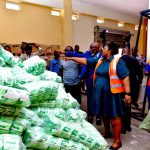Following increasing speculations that the pump price of Premium Motor Spirit, otherwise known as petrol will again go up due to the free fall of the Naira against the dollar, the Nigerian National Petroleum Company Limited has said it had no intention to increase the pump price of petrol.
In a post by the company, posted around 11:48pm on Monday on its official X (formerly Twitter) handle, the national oil firm and major importer of petrol into Nigeria, said it had no intention to increase the pump price of petrol.
“Dear esteemed customers, we at NNPCL Retail value your patronage, and we do not have the intention to increase our PMS pump prices as widely speculated.
“Please buy the best quality products at the most affordable prices at our NNPCL Retail stations nationwide,” the company stated.
The NNPCL Retail is the downstream subsidiary of NNPCL that retails refined petroleum products for the group.
Recall that oil marketers had on Sunday indicated that the cost of petrol would rise to between N680/litre and N720/litre in the coming weeks should the dollar continue to trade from N910 to N950 at the parallel market.
They also hinted that dealers seeking to import PMS were being forced to put the plans on hold due to the scarcity of foreign exchange to import the commodity.
The warning came barely one week after the local currency crossed the N900/dollar ceiling, with the naira selling at over 945/dollar at the parallel market on Friday.
The oil dealers had also said the CBN Importers and Exporters’ official window for foreign exchange, which boasts of a lower exchange rate of about $740/litre, had remained illiquid and unable to provide the $25m to $30m required for the importation of PMS by dealers.
Also, the Nigeria Labour Congress had on Monday warned that its members would commence a nationwide strike without any formal notice if marketers increased the pump price of petrol without concluding the ongoing negotiations.
The NLC President, Joe Ajaero, admonished the Federal Government to stop the falling value of the naira.
In the aftermath of the fuel subsidy removal in May, the organized labour had attempted to down-tool over the skyrocketing prices of goods and services but the Federal Government secured an injunction from the National Industrial Court barring them from embarking on strike.











